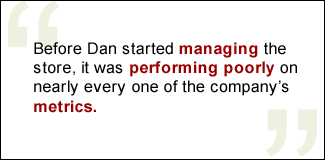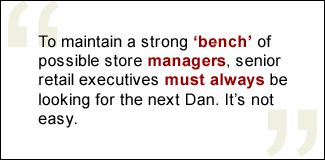Running a successful retail operation is simple. Driving store-level outcomes is easy. Leading and inspiring a team to win? Straightforward. Establishing efficient processes and systems? Not a problem.
Yeah, right.
Managing a retail operation is no simple task. But things run much more smoothly when a store has the right person in place for perhaps the most important job in retail: store manager.
Retailers have a variety of titles for this person: store manager, general manager, store director, etc. Regardless of title, the person I am referring to is the one at the head of the box. While many other positions in a field organization are crucial, retailers can win -- and win big -- if they have a great person in the store manager position. This is a story about one such store, and one such manager.
Dan's the man
 |
Store 255 has just received the "store of the year" award. It is number one in the region for sales growth and has garnered the highest customer service scores in the company. Dan, the store manager, is thrilled about the success of his team, and he beams when he receives the honor from the president of his company. He's excited that his peers are there to see his big moment. It's been a lot of hard work, but Dan knows he has earned this recognition.
Store 255's track record, however, wasn't always so great. Before Dan started managing 255, it was performing poorly on nearly every one of the company's metrics. Staff turnover was higher than the company average. Customers were still shopping, but buying less.
Now, the company couldn't blame all of these problems on the previous store manager. She worked very hard at getting Store 255 up and running. The store had the newest and best of everything: the latest store design, products, and marketing. But something wasn't right. The team was proud to work in the store, but they weren't necessarily proud to work for their boss. Realizing things just weren't clicking at 255, the manager eventually left.
Enter Dan.
After supporting his store manager for the past two years, Dan, an unassuming, quietly confident type, had the opportunity to fill in for her when she went on a two-week vacation. Although he had not received a lot of attention due to his low-profile style, Dan's leadership was showcased during this short period of time. Dan's district manager took notice of his talent for motivating his team members and setting them up for success. People really seemed to want to work for him. Although his stint as a fill-in manager was brief, Dan made a noticeable impact, and he emerged as the perfect candidate for Store 255's new manager.
Although he was a new store manager, Dan was eager to win and excited to lead a team. His personality was low key, but he exuded an upbeat attitude in everything he did. But there was something else: Dan knew what he wanted and knew how to lead. Winning was great, but not enough for Dan. Running a great business, one that he could proudly represent, meant everything to him. Immediately after he assumed his leadership role, he created a plan and put it into action. His first step was motivating his team.
The foundation
Dan knew his talents. He knew what he liked to do and what he was good at -- things like inspiring people, finding the right fit for them, and setting them up for success in their roles. But he also knew that his front-line staff lacked clear goals to spell out what they needed to do. So Dan assessed everyone on his team and started to build a team of focused players.
Dan knew that some of his team members were invaluable to Store 255. One employee, Sheila, would stay past closing to straighten and replenish the inventory in other departments. So Dan put her in charge of the recovery team. Another employee, Jamal, had an infectious passion for the product, but his talent was wasted at the checkout counter. Dan put him on the sales floor. Once he began working on commission, Jamal's pay nearly doubled.
On the other hand, some of the department managers were all but driving employees out of the store. Not everyone can lead, as Dan knew well. This was a more difficult situation, but Dan carefully migrated those managers into positions with similar responsibilities and prestige that did not involve managing people. Moves like these made Dan's team much stronger.
Focusing on the customer -- from the customer's point of view
It was clear to Dan that the business needed to grow faster. Looking at the store from the customer's point of view was Dan's next priority. When Dan first started managing Store 255, the employees didn't believe in their ability to offer great customer service, and this in turn framed the customers' impression of the store and brand.
Dan carefully reviewed the service standards with his team. He began identifying the key drivers of customer impression and coaching his team to a higher level of performance. In fact, Dan stood in the middle of his selling floor, observed his team's sales skills, and gave them direct feedback. He also talked to customers and monitored traffic flow.
 |
By taking this customer-focused approach, Dan taught his team both the importance and the impact of great service. Then, as a group, Dan and his team created a plan that dealt with everything from service expectations to hours of business and staffing models. This plan seized the business opportunities in front of the team and corrected the problems the store currently faced. By emphasizing the importance of customer service, Dan was able to positively influence customer impressions of his store. As customer complaints decreased, his team's belief in its ability to provide quality service increased, and total sales grew. Success!
Overcoming operational hurdles
With a more motivated team and a customer service plan in place, Dan turned his attention to the backbone of the store: its operational systems. Dan knew that without a solid system to make it happen, his plans and results would falter. So planning for each day's business -- and establishing processes of execution -- was crucial for Store 255's continued success.
Before Dan started managing 255, the store presented many operational hurdles, some of which interfered with business. Shipments would arrive, but there was no plan for placing new products, which delayed new items from being placed on the selling floor. Often, the store would run out of necessary supplies, and there was no clear plan to place new orders. Each day's business would kick off without clear sales goals or service objectives. During peak hours, lines of customers would back up at the register, but there was no system for how and when to call for additional support. All of this just resulted in ongoing confusion.
Dan knew it was crucial to make systems a non-negotiable part of his store. Ensuring that specific store processes, such as shipment processing, staff scheduling, and supply ordering, became "standard operating procedure" meant that employees' energy and creativity could be channeled into customer service and people development. By establishing clear procedures, Dan could spend more time with his team and his customers. Eventually, clear operating procedures -- and Dan's expectation that they be followed, every time -- enabled store operations to run on autopilot. This was another key to Dan's success.
Keystone position
Dan's three-pronged approach to his role as store manager -- build a strong team, focus on the customer, and support employee performance with tight operating systems -- successfully drove increased sales. Turning this troubled store around wasn't easy, but Dan knew what he wanted and how to get it. Dan was less experienced than many of his peers, yet within three years, his store was outperforming the rest in his region.
To maintain a strong "bench" of possible store managers, senior retail executives must always be looking for the next Dan. It's not easy. A passion to manage in the retail business and the ability to lead a team are vitally important. Not all store managers have both those qualities; often, they achieve their positions because of tenure or operational abilities. In Dan's case, he might have been the least experienced candidate, but he was the most focused and passionate.
Having the right store manager in place makes a world of difference, as it did in Store 255. This role is the most critical in a retail field organization. Typically, the district manager's role is to check for compliance. Ensuring standards are met and keeping every store on an even keel, both of which are important roles, are a major part of the job. But store managers have the biggest impact on a store's success because they set the standards for what the customer sees and how the team performs. High standards lead to high performance.
So Dan has a right to beam at the awards ceremony, to be proud of his team, and to make even bigger plans for his store. And his company should be looking in every store location for the next Dan.